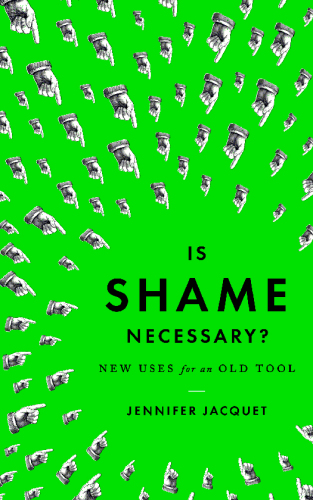
Is Shame Necessary?
New Uses for an Old Tool
کتاب های مرتبط
- اطلاعات
- نقد و بررسی
- دیدگاه کاربران
نقد و بررسی

November 24, 2014
This debut from NYU Environmental Studies assistant professor Jacquet puts forward the thesis that shame can be harnessed as an unlikely weapon for justice in the social-media age. She begins by showing that many of today’s ethical movements have fizzled because consumers are satisfied by alleviating their own consciences, rather than effecting widespread change. Jacquet then offers a clear and helpful distinction between guilt, defined as holding someone accountable to his or her own standards, and shame, meant to hold an individual accountable to group standards or norms. Comparing the two human instincts of avoiding shame and acquiring honor, she argues that the former is more deeply-rooted, and the latter is regarded as essentially optional. After describing useful techniques for applying shame, the book turns to the specific areas where it could be put to good use. Jacquet takes too much for granted in some of her underlying points, such as that individual achievement is antithetical to humans’ social nature. A more philosophical examination of the subject is warranted, but the book serves as an astute how-to and defense of shame.

Starred review from December 1, 2014
An intellectually stimulating discussion of shame and its enduring place in the digital age.It's been a long time since Hester Prynne was forced to wear the scarlet letter around town, but shame has never left us. Jacquet (Environmental Studies/New York Univ.) uses lively prose and keen insight to explore the myriad ways the shame game continues to impact our everyday lives. Unlike the dark, secret interiors of guilt, shame is often a communal experience, an important way for society to discourage behavior it deems undesirable. Whether publishing the names of heavyweight tax dodgers online or exposing the nefarious moneymaking schemes of the giant telecoms, shame can work wonders on transgressors in need of an immediate course correction. However, as Jacquet also cautions, shame is an often unwieldy instrument that carries the potential of backfiring on those endeavoring to correct unwanted actions. The author looks at examples involving environmental conservation and overfishing, among others, to make the point. In both instances, instead of being shamed into changing behavior, the most egregious offenders somehow managed to slip through the cracks while far less significant offenders were held fast. Jacquet tackles "green guilt" head-on when she explodes the very first recommendation at the end of An Inconvenient Truth and its appeal to buy energy-efficient appliances and light bulbs. As she reminds us, "household lighting accounts for only 2 percent of total U.S. carbon emissions and 6 percent of household energy use (excluding diet)." While there are judges out there who gleefully revel in literally hanging shaming signs around the necks of hard-pressed shoplifters and the like, Jacquet demonstrates a much greater understanding of shame when she likens it to an antibiotic whose effectiveness depends a lot on whether the proper dose is used at the right time. A sharp and surprising dissertation that puts the many facets of shame in a whole new light.
COPYRIGHT(2014) Kirkus Reviews, ALL RIGHTS RESERVED.

October 1, 2014
The word shame has a negative ring, but Jacquet turns it on its head, arguing that while guilt grounds conscience, making us stick to higher standards, shame is a tool we can use to challenge major organizations from corporations to government. From a rising star in her field.
Copyright 2014 Library Journal, LLC Used with permission.

























دیدگاه کاربران